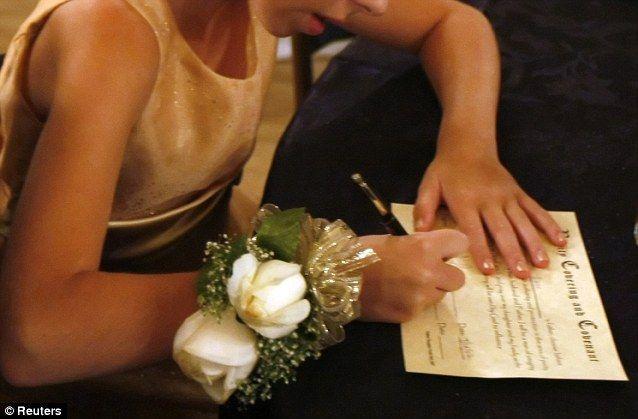Purity culture — the cultural construct that promotes remaining “pure” in the eyes of the Lord, purity rings, contracts to remain celibate until marriage and father/daughter dances where young girls pledge to maintain their virginity — harm all women.
Perpetuating the idea that women are only worth something if they are well-behaved virgins who don’t express their femininity only serves to tear women down, especially here in the South, where purity culture is often steeped in deeply religious roots.
But some women are torn down by purity culture far more than others.
Dianna E. Anderson, who is currently researching for a book on purity culture, found that women of color are innately perceived as more promiscuous than their white peers — and thus less human in the eyes of people who preach modesty.
The spokeswomen of the modesty culture movement — Elisabeth Elliot, Leslie Ludy and Stasi Eldredge — are all white, thin, heterosexual, able-bodied women. They travel through evangelical circles, speaking on the evils of behaving in a way that is not “pure.”
Behaving purely means more than just not having sex. It means dressing, speaking and behaving in a pre-prescribed way. It means not listening to certain kinds of music, not dancing in a way that could be perceived as sexual and not spending time alone with men.
Living a life of approved modesty is difficult for anyone, but for women of color, it’s nearly impossible.
For example, purity culture has waged a war against Beyoncé. She is the antithesis of everything they preach. She is unapologetically sexual. Despite the fact that she is a married woman, her expression of sexuality is impure because she does it on a global stage.
And because she violates the careful rules set forth by the modesty doctrine, she is less than human. White pop stars who flaunt their sexuality do not face nearly the same level of scrutiny as Beyoncé, whose name has become synonymous with everything wrong in millennial culture for conservatives.
Women of color have a long history of being sexualized simply because of their race. Black women in particular are largely viewed by puritanical culture as creatures who are promiscuous by their very nature.
Though modesty culture pretends — as most isolationist religious movements do — that it’s for everyone, their actions do not match their come one, come all preachings.
Secret Keeper Girl, a mostly white, all-female purity ministry, spent 2013 attempting to raise money to take its tour into the “inner city” of the Bronx to bring its message to black women who the group assumed needed to be trained.
On its website, Secret Keeper Girl bemoaned the state of Bronx churches, saying that the pastors had given up on their congregations by not pigeonholing female churchgoers into the modesty movement. The group believed that the black church community needed to be taught how to train its members by a group of white women who had no affiliation with it at all.
This is just one of the many examples of puritanical groups looking down on women of color with pity, and the consequences reach much further than just disrespectful racist thoughts.
Consider that when conservatives discuss abortion, they will sometimes make an exception to their hardened anti-choice stance when it comes to rape. This is not compassion on the part of conservatives, but an attempt to maintain the purity of a girl who they believed was unfairly robbed of her modesty.
Women who have consensual sex and become pregnant do not garner the same sympathy because they chose to violate their own purity and must face the consequences.
In the black community, where access to birth control and other forms of reproductive health care are severely limited, a woman who becomes pregnant does not deserve the right to control her own body because she gave up that autonomy when she violated the modesty pact purity culture dictates.
I asked some young women on LSU’s campus if they had anything to say about purity culture, and I was met with confusion. They seemed completely divorced from the concept, discussing it as if it were something completely separate from their lives.
One woman asked if I was referring to purity rings, and when I confirmed that I was, she said “Oh no, that’s a white girl thing. We don’t do that.”
Despite the efforts of various groups to “save” women of color from their naturally sexual ways, it appears that most black women feel completely divorced from the entire concept.
Purity culture tells women they are impure by nature and must take steps to rectify themselves within the narrow guidelines set forth in order to regain their pure status.
But no matter what they do, women of color cannot fit into the box created by the modesty doctrine, and that, unfortunately, is leading to them being disenfranchised in far more harmful ways than anyone deserves, regardless of how they behave.
Logan Anderson is a 21-year-old mass communication senior from Houston, Texas. You can reach her on Twitter @LoganD_Anderson.
Opinion: Purity culture disproportionately affects women of color
February 10, 2015
More to Discover








